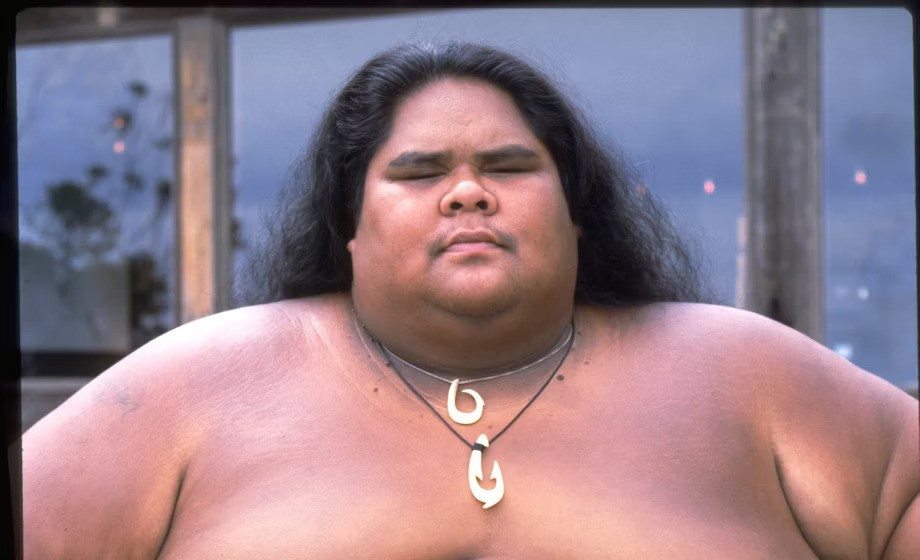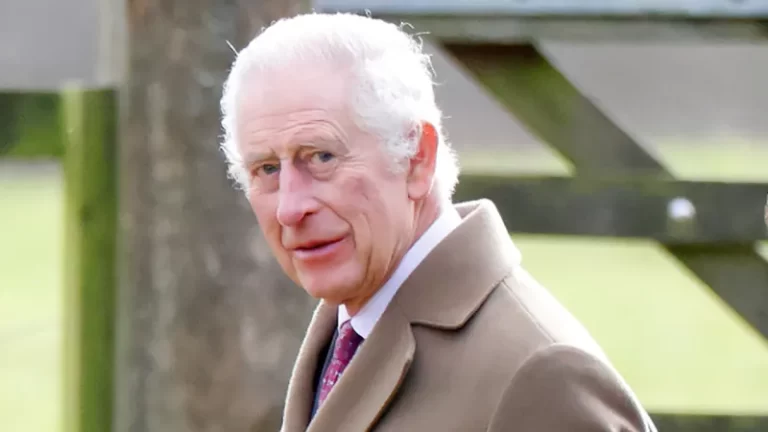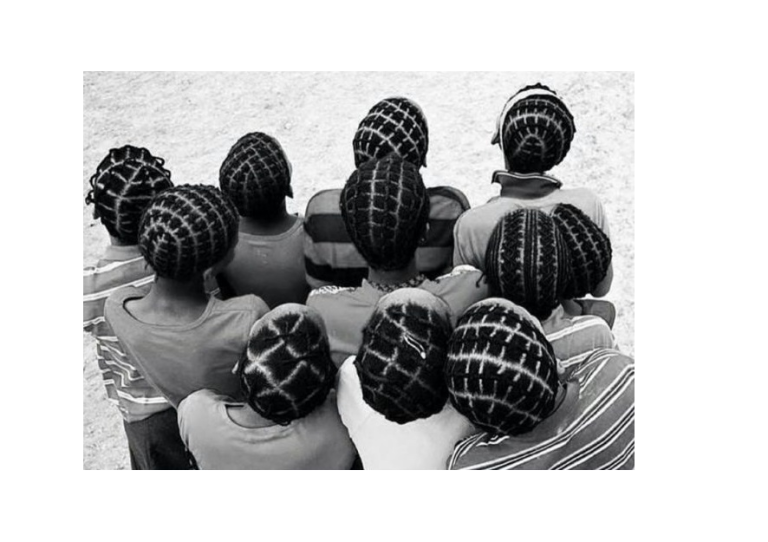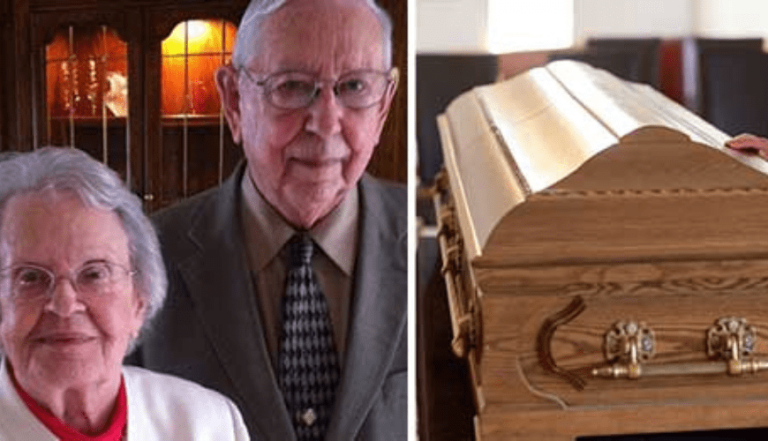Israel Kamakawiwoʻole: The epic story of the Hawaiian singer’s iconic cover
Also known as Bruddah Iz, Israel Kamakawiwo’ole captured the hearts of people worldwide with his version of “Over the Rainbow.” He passed away in June 1997.
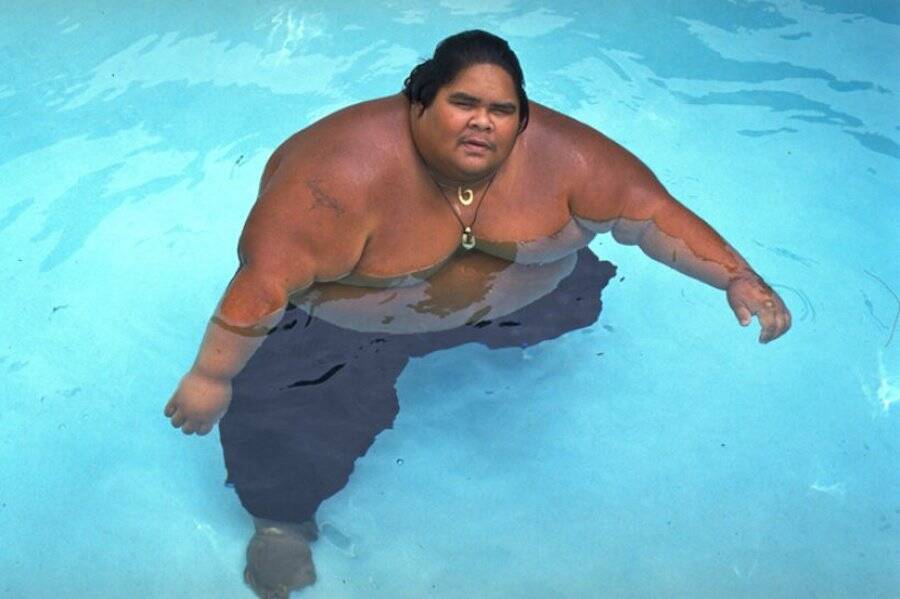
Israel Kamakawiwo’ole, also known as “Bruddah Iz,” could fill a room with silence using just his voice and a ukulele. Before he passed away at the age of 38 in 1997, he often moved people around the world, especially with his famous version of “Somewhere Over the Rainbow.”
In Hawaii’s Indigenous community, Kamakawiwo’ole is proudly remembered as an activist for state sovereignty, helping his people fight for their identity. Today, he is still regarded as the voice of Hawaii.
This is the captivating story of Israel Kamakawiwo’ole, from his unique music to his untimely death.
Israel Kamakawiwo’ole’s Love Of Music From An Early Age
Israel Ka’ano’i Kamakawiwo’ole was born in Honolulu, Hawaii, on May 20, 1959, to Henry “Hank” Kaleialoha Naniwa Kamakawiwoʻole Jr. and Evangaline “Angie” Leinani Kamakawiwoʻole. Both of his parents worked at a popular nightclub in Waikiki, where Angie managed the club, and Hank worked as a bouncer and drove a sanitation truck at the U.S. Navy shipyard in Pearl Harbor.
At the age of 11, he started playing the ukulele with his brother and cousin. Although it helped that his uncle, Moe Keale, was a musician and even appeared on *Hawaii Five-O*, Kamakawiwo’ole forged his own path in music.
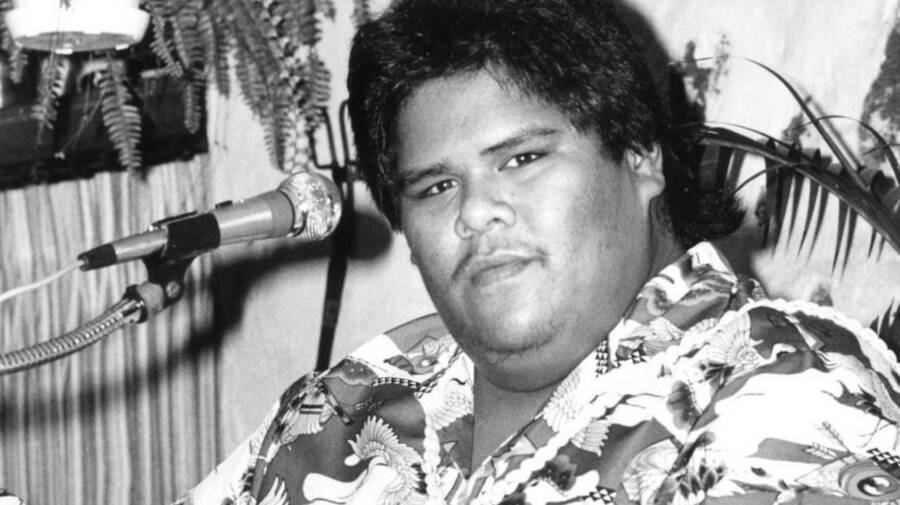
The time Kamakawiwo’ole spent with his cousin and brother was important for his musical growth, but so were the summers he spent with his grandparents on Ni’ihau. This island is the westernmost main island of Hawaii and is entirely populated by Indigenous people. Only family members, invited guests, government officials, and supervised tourists are allowed to visit.
As a child, Kamakawiwo’ole became interested in the music of popular Hawaiian entertainers like Peter Moon, Palani Vaughan, Keola Beamer, and Don Ho. These influences can be heard in his own music later on.
Bruddah Iz Forms A Band
At the age of 17, Israel Kamakawiwo’ole formed a band called Mākaha Sons with his older brother Skippy. Their music combined contemporary and traditional styles and quickly became very popular.
Even though he dropped out of high school and struggled with drugs and alcohol, he ended up at a graduation party where many of his classmates heard him sing for the first time. His friend Del Beazley remembers that moment vividly.
“As soon as Israel Kamakawiwo’ole opened his mouth and sang, the whole place went quiet,” Beazley said. “Every great singer has something special. He had a unique tone that cut right through the air and stopped everyone in their tracks.”
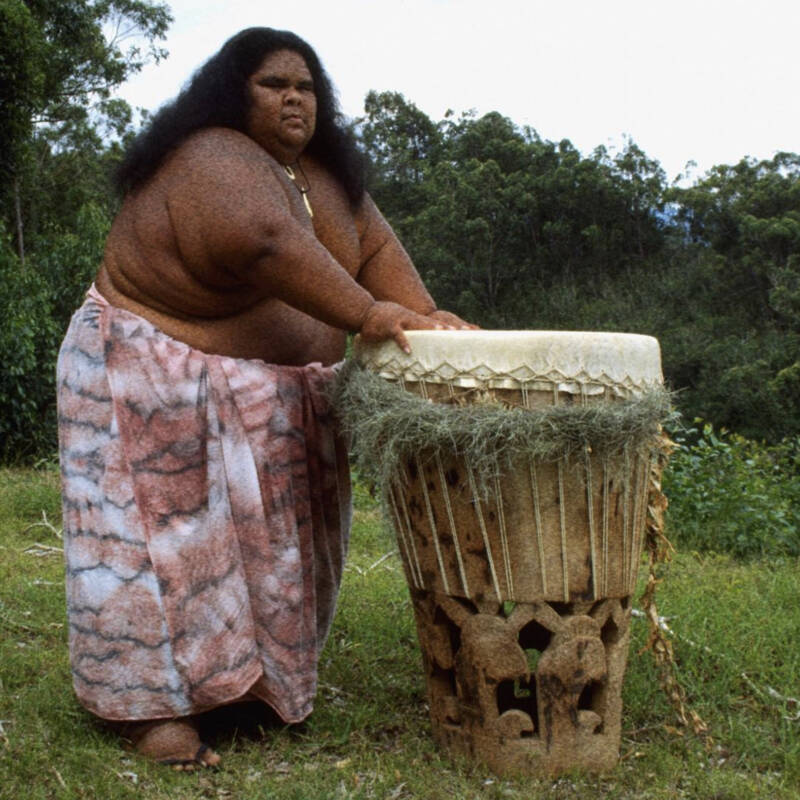
Mākaha Sons provided authentic Hawaiian songs for their people during a time when most Hawaiian music was commercialized and aimed at pleasing mainland America. This type of music, known as hapa haole, often included more sexual themes and was sometimes racist.
Mākaha Sons played a key role in the Hawaiian Renaissance, which aimed to restore the islands’ unique cultural identity and move away from the tourism-driven culture that had developed.
Despite starting his career and using his voice to represent his people, Kamakawiwo’ole faced a significant setback when his brother Skippy passed away in 1982 from a heart attack related to obesity at just 28 years old. This tragic loss also foreshadowed Kamakawiwo’ole’s own death 15 years later.
However, Kamakawiwo’ole persevered and changed his life forever with one recording in 1988. It was 2:30 a.m. when he drunkenly called recording engineer Milan Bertosa from a payphone at Sparky’s Bar, a well-known spot in Honolulu. He requested, “Please, can I come in? I got this idea.”
Israel Kamakawiwo’ole’s Iconic Rendition Of “Over The Rainbow”
“And in walks the largest person I had ever seen in my life,” Bertosa recalled, referring to Israel Kamakawiwo’ole’s size. “The first thing I needed to do was find something for him to sit on. Then I set up some microphones, did a quick soundcheck, rolled tape, and the first thing he played was ‘Somewhere Over the Rainbow.’ He sang and played it in one take, and that was it.”
From that moment on, that song was requested at every show until Kamakawiwo’ole’s death.
Kamakawiwo’ole’s debut solo album in 1990 included “Somewhere Over the Rainbow,” but it was produced with added instruments and combined with a cover of Louis Armstrong’s “What a Wonderful World.” The acoustic version, which he had been working on for years, was what truly resonated with people. This version was recorded in one take and had some technical imperfections, such as changed lyrics and a few wrong chords, but those flaws may have made it feel more relatable.
It wasn’t until 1993, while working on Kamakawiwo’ole’s next album, *Facing Future*, that Bertosa realized the acoustic version needed to be included. This decision proved to be wise, as the album went platinum and became one of Hawaii’s best-selling records ever.
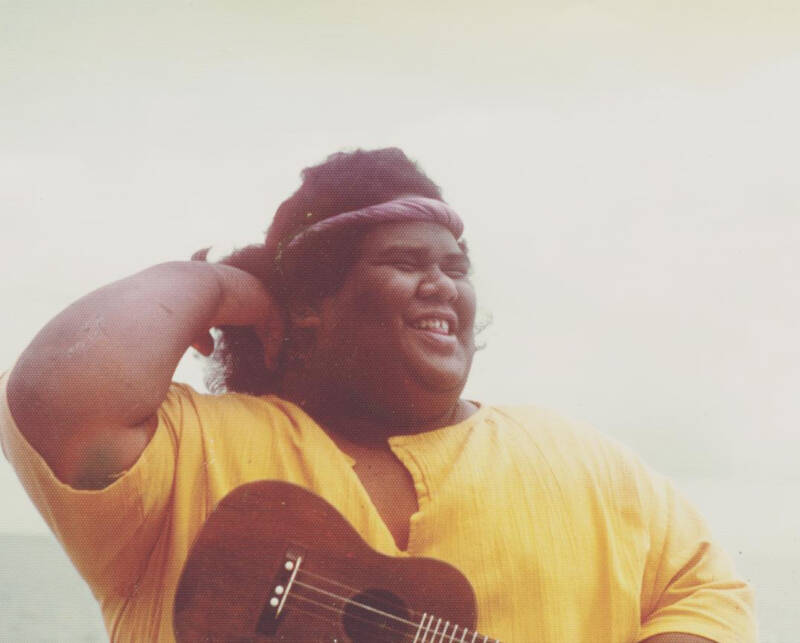
“It was just that special,” he recalled. “Whatever was happening that night, he was inspired. It felt like we captured a perfect moment.”
This couldn’t have come at a better time for Kamakawiwo’ole. By then, he had his own family, including a wife and child, and he was struggling to take care of them while living on a small welfare income. However, the success of *Facing Future* helped solve his financial problems.
While his music was used in commercials for everything from Rice Krispies to cologne, many Hawaiians connected deeply with the song “Hawai’i ’78.” The lyrics imagined what their ancestors must have felt as they watched the islands being taken over by people who cared more about making money than preserving culture. The song’s powerful lyrics resonated with listeners.
“Could you just imagine they came back
And saw traffic lights and railroad tracks
How would they feel about this modern city life?”
Unfortunately, even with financial security and growing fame, Kamakawiwo’ole couldn’t escape what was coming. His health problems, similar to those his brother faced, led to his sudden and early death.
Israel Kamakawiwo’ole’s Death And The Tragic Story Behind It
Toward the end of his life, Israel Kamakawiwo’ole struggled with his weight. He found it hard to perform and had to use an oxygen tank. He often stayed in the hospital, where friends would sneak him Oreos, even after the death of his brother. Although he needed a forklift to get on stage, he still had a sense of inner peace.
“I’m not scared of dying,” he said. “Because we Hawaiians live in both worlds. When my time comes, don’t cry for me.”
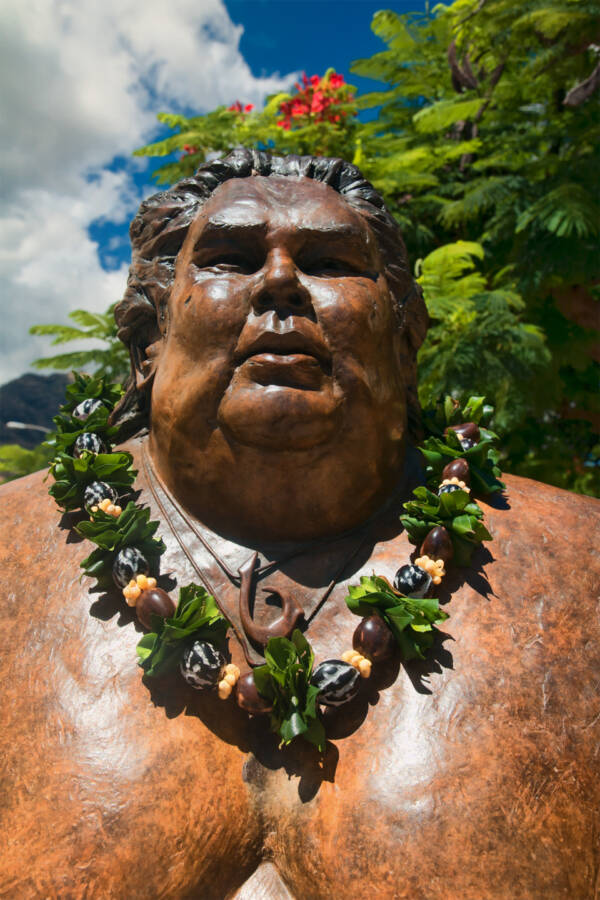
On June 26, 1997, *The Honolulu Star-Register* reported that Bruddah Iz, the voice of Hawaii, had passed away at just 38 years old. Israel Kamakawiwo’ole died from respiratory failure. Many people called into KCCN-FM radio station, crying for hours. Meanwhile, his family and friends built a casket using wood from all the islands.
On the day of his funeral, the flag was flown at half-mast.
Around 10,000 people gathered in the ocean to witness his ashes being paddled to Makua Beach. His death was a day of mourning for all of Hawaii. Hundreds paddled alongside as his ashes were scattered, and respectful air horns from trucks on land echoed across the water.
The Proud Legacy Of A Big Man With An Even Bigger Heart
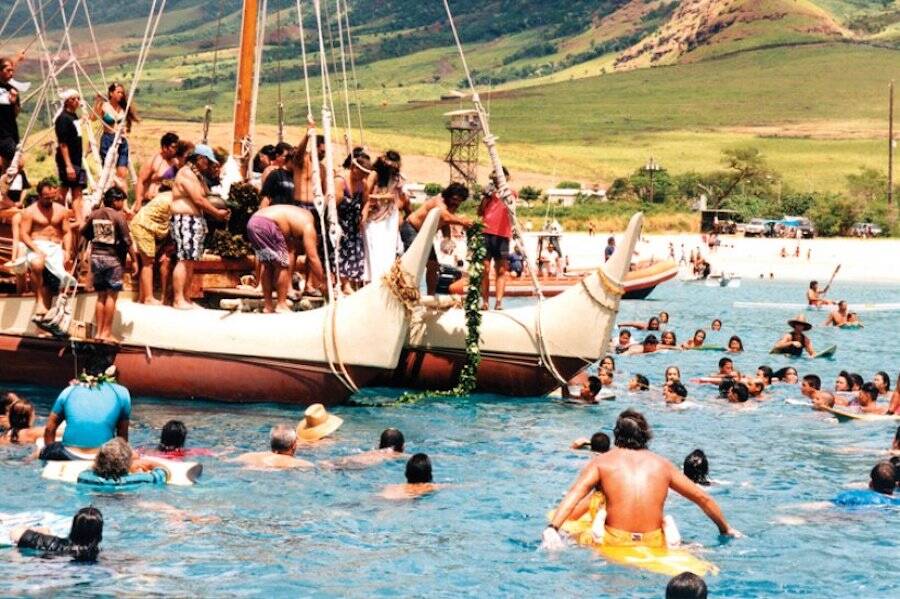
Bruddah Iz stood six feet two inches tall and struggled with obesity throughout his life, weighing over 1,000 pounds when he died in 1997. His average weight was around 750 pounds.
However, his physical size was small compared to his love for the Hawaiian people. As a lifelong advocate for Hawaiian sovereignty, he fought against tourism and corporate influence, which is why the entire island of Oahu came together to honor him.
Israel Kamakawiwo’ole’s body was displayed publicly in the state Capitol courtyard, a rare honor previously given only to two government officials. The Hawaiian governor at the time, Benjamin Cayetano, faced some criticism for this decision but defended it.
“Israel was a state treasure. He was a giant in his field,” he said. “He had achieved a special status. The state Capitol is a facility that belongs to the people and symbolizes public trust.”
For those outside Hawaii, Israel Kamakawiwo’ole is just a voice in commercials and movies. But for Hawaiians, he was a gentle giant who left too soon yet inspired his people profoundly.
You may also like:
Robin Williams cried every night and didn’t share wife’s bed in last days after diagnosis
